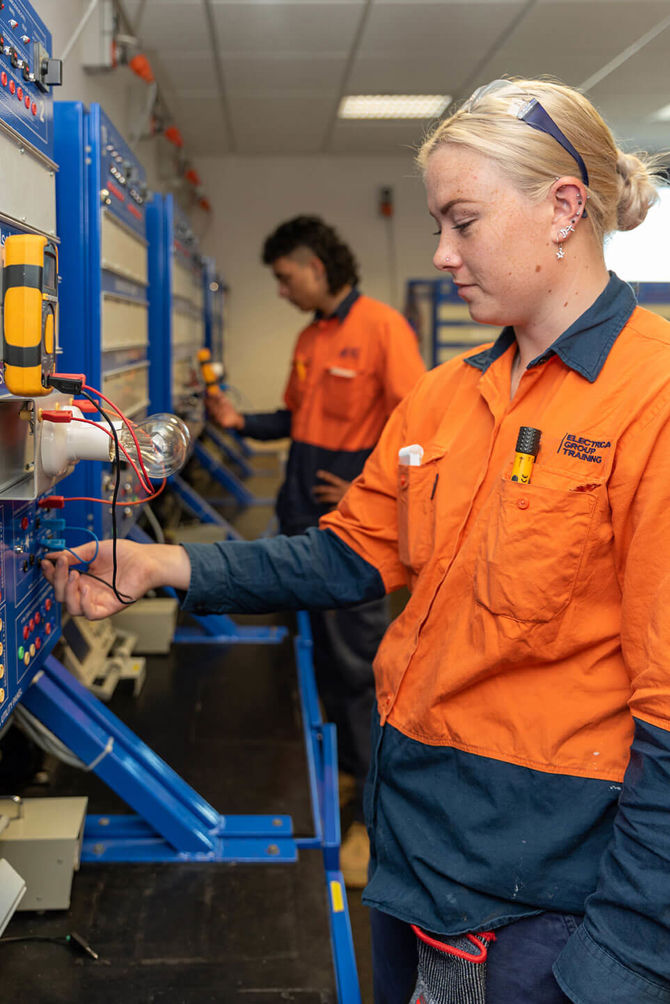
Electrical apprenticeships Perth
What is an electrical apprenticeship?
An electrical apprenticeship takes place over a four year period, during which an apprentice works under a fully licensed electrician to learn all about, and become qualified in, the electrical trade.
It combines practical experience in the workplace with structured off-the-job training at a contracted training provider such as the College of Electrical Training.


What are the benefits of an electrical apprenticeship?
Electrical apprenticeships provide more than just a pathway into working as a qualified electrician. You will gain valuable life skills which you will go on to use every day.
At the end of the four years, you will have an in-demand trade qualification, a set of skills that will make you a highly desirable employee, and the option to become your own boss in the future (with further training). The qualification and skills you acquire are highly sought after across a wide variety of industries.
Your trade qualification may even be recognised as prior learning for some university courses, such as electrical engineering, or for other vocational pursuits, as many of the skills taught in an apprenticeship in the electrical industry are highly transferable.
And don’t forget that an apprenticeship pays you to learn. So while your friends at uni might be accruing a mountain of debt - as an apprentice you’ll be earning money while studying. That means that you get a leg up at the start of your career!
Become an electrical apprentice today!
Apply today to become an electrical apprentice with EGT.
What does an electrical apprenticeship involve?
Apprenticeships offer you the ability to earn money while you earn a qualification, learn a trade and build practical skills.
In Western Australia, apprenticeships are delivered under a competency-based, flexible training system. Workplace, and off-the-job training and assessment procedures are based on the skills an apprentice should acquire over the term of the apprenticeship. Off-the-job training is usually completed one day per week or as a block (between one and three weeks at a time) at a training provider such as the College of Electrical Training. The rest of the time is spent on-the-job.
Applicants must be able to demonstrate the following:
- The ability to undertake manual tasks
- Self-starter / positive attitude
- Strong communication skills
- Ability to liaise with customers, clients, and management
- Provide evidence of colour vision testing
- Be able to pass ongoing drug and alcohol screening
- Good mathematics skills and a willingness to learn.
Applicants are required to complete the online application form and upload the following documentation/evidence:
- Birth certificate, Australian Passport, or proof of residency
- Drivers Licence
- Pre-apprenticeship or National Readiness Assessment
- Colour Vision test result
- USI Number.

What are the career options for an electrician?
Qualified electricians have a range of career options available to them, including:
- Electrical contractor: Working for an electrical contractor allows electricians to work on a range of projects, including electrical installations and maintenance in residential, commercial, and industrial settings. It can lead to supervisory or management roles.
- Specialisation: Electricians can specialize in areas such as industrial automation, renewable energy, or smart home automation, which can lead to better career prospects and higher earnings.
- Consultant: Qualified electricians can become consultants, providing advice on electrical systems, energy efficiency, or safety standards. This can involve inspections, developing maintenance plans, and providing training on electrical safety procedures.
- Entrepreneur: Starting an electrical contracting business can be a lucrative and rewarding career path, allowing electricians to be their own boss, set their own hours, and choose the type of work they want to do.
- Industry-specific roles: Electricians can also find work in industries such as construction, mining, oil and gas, or telecommunications.
As a qualified electrician, the skills you learn during your apprenticeship can lead to a wide range of job opportunities. The electrical industry is diverse and constantly evolving, with emerging technologies leading to new and exciting possibilities. Whatever career path you choose, an electrical apprenticeship in Perth provides a solid foundation for a successful and rewarding career.

How much can electricians earn?
Electricians are among the highest-paid trades in Australia. Entry-level positions start at a nudge over $70,000 per year, while most experienced workers can make well over six-figures per year.
However, it's important to note that salaries can vary depending on the location, employer, and the specific role.
What is the salary for an electrical apprentice?
All apprenticeships in Australia are subject to federal awards that outline apprentice pay rates. The Fair Work website offers a Pay Calculator to determine what you will earn based on your apprenticeship.
Apprentice wages increase as you progress to the next level, which can be determined by time or level of competency. Your apprenticeship award will determine which of these applies, as well as the other entitlements you will receive.
Electrical apprenticeships fall under the Electrical, Electronic and Communications Contracting Award 2020 [MA000025], and the pay rate for an electrical apprentice who started before turning 21 is as follows:
| Year | Weekly salary |
| 1 | $631.52 |
| 2 | $742.29 |
| 3 | $797.67 |
| 4 | $930.59 |
Note: Salaries can vary depending on the location, employer, and the specific role. Also please note, the wage rates above are effective from the first full pay period on or after 1 July 2024.

What is the future outlook for electricians?
The demand for skilled electricians is on the rise, and this trend is expected to continue as the aging workforce retires, resulting in a shortage of talent. The industry is expected to boom in the coming years, with a projected 6.7% growth in the next 5 years (2025-2030). As the industry grows, so does the competition to attract top talent, as businesses and individuals need to hire skilled electricians to carry out various electrical projects.
The electrical field is attractive to future employees, not only due to the high potential earnings, but also because of the rise in new technologies, such as robotics, home automation, and renewable energy, that create exciting new job opportunities. This is particularly true here in Western Australia, where the mining and resources sector is a significant employer, and where the growth of the renewable energy industry is a top priority.











